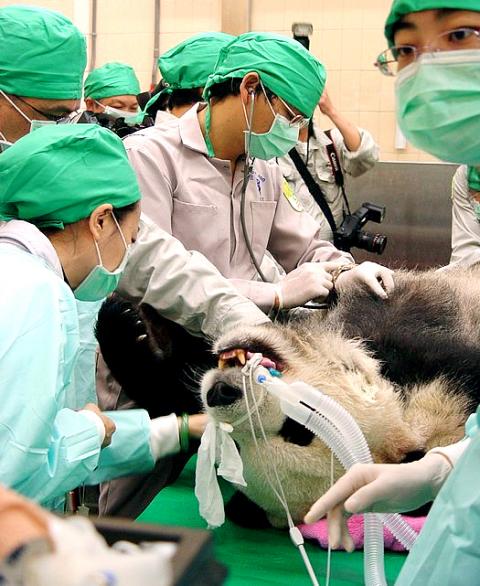AI @ Taipei Zoo
Taipei Zoo yesterday started an artificial insemination program for giant pandas Tuan Tuan (團團) and Yuan Yuan (圓圓) following a failed attempt to prepare them for mating on Friday night.
The two pandas had been placed in the same room on Friday night to encourage them to mate after Yuan Yuan, the female panda, showed signs of being in heat, Taipei Zoo spokesman Chao Ming-chieh (趙明杰) said.
However, zookeepers separated the pair 20 minutes later after they appeared uninterested in mating.
After the failed attempt, the zoo held a discussion with panda expert Huang Yan (黃炎) from the Wolong Panda Base in China’s Sichuan Province, and domestic experts, and decided to collect sperm from Tuan Tuan for artificial insemination, Chao said, a program which they began yesterday morning.
The zoo plans to proceed with a second round of artificial insemination today.
“The mating season for the two pandas is over because Yuan Yuan’s period in heat is over for the year. Hopefully the artificial insemination program will give us good news,” he said.
According to Chao, Yuan Yuan’s appetite and sleep patterns have returned to normal and the zoo would try again next year if the artificial insemination program fails, because pandas have only one estrous cycle every year.
The zoo’s Panda Hall will still be open to the public today, he added.
The zoo has been hoping to get Yuan Yuan pregnant since China gave Taipei the two pandas as a gift in 2008. The two pandas, now seven years old, are at their most fertile age, which is from seven to nine years old.
Because a panda’s pregnancy ranges from 70 days to five months, Chao said the zoo would closely monitor Yuan Yuan’s situation over the next two months, giving her urine tests and ultrasounds to find out if she is pregnant after the insemination program.
With the artificial insemination success rate standing at about 60 percent, he said the zoo would continue its efforts to encourage reproduction next year if this year’s attempt fails.
Source: Taipei Times










